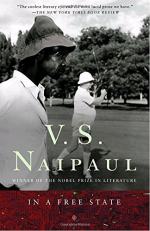|
This section contains 5,402 words (approx. 19 pages at 300 words per page) |

|
SOURCE: “Naipaul's Third World: A Not so Free State,” in The Journal of Commonwealth Literature, Vol. 10, No. 1, August, 1975, pp. 10-22.
In the following essay, Thieme compares In a Free State to Naipaul's earlier work and concludes that this later effort shows the author moving beyond themes of the wretchedness of Third World colonial life to reflect his personal ability to free himself from the shackles of a colonial mentality.
For many West Indian intellectuals the work of V. S. Naipaul has always represented a denial of the third-world spirit. For writers like Lamming,1 Naipaul's ironic eclecticism and brahminical aloofness have made him a stereotype of the colonial Anglophile. East Indian by descent, Trinidadian by birth, English by virtue of his Oxford education,2 Naipaul has given credence to the view of him as the paradigm colonial by his many scathing comments on the West Indies: he dismisses Trinidad as...
|
This section contains 5,402 words (approx. 19 pages at 300 words per page) |

|


